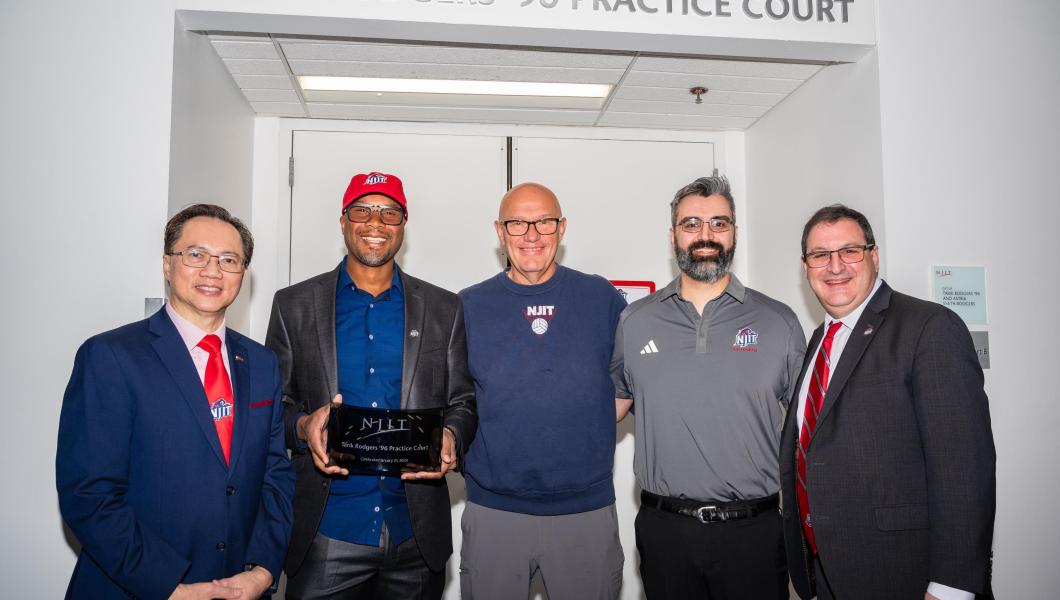NJIT Welcomes Latin American Consul Delegation to Strengthen Ties

New Jersey Institute of Technology (NJIT) this week welcomed a delegation from Grupo Latinoamericano de Cónsules en New Jersey (GLACO) as well as city and state government leaders to explore the university and learn about its mission and initiatives, particularly in light of NJIT’s designation as a Hispanic Serving Institution (HSI). The visit provided an opportunity for GLACO and government members to learn more about NJIT’s diverse programs, student enrollment, and commitment to supporting the Hispanic and Latine communities.
The delegation, led by GLACO President and Head Consul of Mexico Mariana Diaz, included representatives from seven Latin American countries: Ecuador, Colombia, Mexico, Paraguay, El Salvador, Guatemala and Peru. During their visit, the consuls met with NJIT President Teik Lim, Trustee Elisa Charters, Foundation Board of Directors Chair Bob Medina and Chief Diversity Officer David Jones, among other university leaders, to discuss the growth and goals of NJIT’s Hispanic-student enrollment and success.
GLACO was established with the purpose of promoting the interests of its member countries and the defense of the rights of their nationals. It promotes the progress and welfare of its populations living in this region, strengthening its economy, culture, history and life.
NJIT noted several key facts for the delegation: In addition to its HSI status:
- NJIT’s classification as an R1 research institution makes it the only university in New Jersey to hold both designations and one of only 22 nationwide;
- 62% of all engineering degrees awarded to African-American and Hispanic students by New Jersey public institutions are awarded by NJIT;
- NJIT produces a $2.8 billion positive economic impact on New Jersey annually.
National rankings also tell the story of NJIT’s success: U.S. News & World Report ranks NJIT a Top 50 public university; The Princeton Review places NJIT No. 23 in Best Value; and The Wall Street Journal puts NJIT No. 26 nationally for alumni salaries.
GLACO members were particularly interested in NJIT's efforts to bridge connections between higher education and the Hispanic community, both locally and internationally. NJIT's growing Hispanic enrollment, which now stands at 28.1% of full-time undergraduate students (up from 20% in 2020), showcases this commitment. The growth in the Hispanic student body coincides with university efforts to advance diversity among faculty, and Jones discussed how NJIT continues to advance DEIB-targeted initiatives, faculty training and cross-cultural collaboration.
On the horizon, NJIT touted its recently announced $10+ million new AI investment, which will grow the institution’s AI efforts in multiple areas, including faculty expertise, AI teaching programs, industry partnerships and applied research. This effort augments NJIT’s already significant AI academic activities, including $60 million in related research last year and the graduation of more than 1,600 students in this field since 2020.
Touting NJIT’s New Jersey Innovation Institute (NJII), President Lim called NJII the “front door” to NJIT for business and industry. Luis De La Hoz, chair of the Board of Directors of the Statewide Hispanic Chamber of Commerce, reiterated to the group that Latinas are starting businesses at six-times the rate of any other group in the U.S.
All of this, Lim noted, is under the umbrella of NJIT’s 2030 strategic plan, which calls for NJIT to become a nexus of innovation that is a physical and intellectual focal point for ideas, actions and people and brings together researchers, learners, entrepreneurs and partners from government, industry and the community to pursue innovation.
Lim emphasized NJIT's commitment to diversity and collaboration during the visit, stating, "Diversity is at the core of NJIT's mission. We are dedicated to fostering an inclusive environment where students from all backgrounds can thrive. This visit from GLACO strengthens our commitment to making higher education more accessible to Hispanic and Latine communities, both locally and globally, as we continue to build partnerships that drive innovation and socioeconomic impact."


